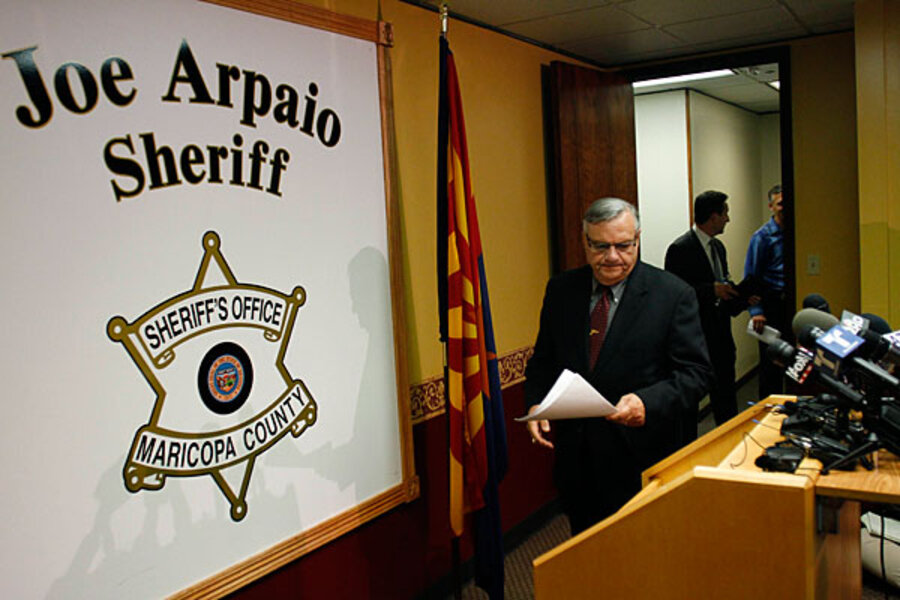Justice Department sues Joe Arpaio for discrimination: Is he cornered?
Loading...
| Phoenix
The Justice Department made good on its promise to sue Maricopa County Sheriff Joe Arpaio Thursday, reiterating accusations that the longtime lawman and his department systematically discriminate against Latinos and retaliate against critics.
Assistant US Attorney General Thomas Perez called the legal action an unusual step taken as a last resort in light of Mr. Arpaio’s unwillingness to cooperate.
Efforts to address “serious civil rights and public safety issues have proven elusive here in Maricopa County,” Mr. Perez said at a news conference.
The lawsuit, filed in US District Court in Phoenix, asks a federal judge to issue an order halting alleged discriminatory practices the Justice Department identified in a civil-rights investigation that lasted three years. It also asks the judge to require the sheriff’s department to adopt policies and police training that rectify the problems.
"Federal judges have a lot of discretion and flexibility in these types of cases,” says Paul Bender, a constitutional law professor at Arizona State University in Tempe. “With Sheriff Joe you never know, but what could happen is he could have a federal court declaring that he’s acting unconstitutionally and illegally, and ordering him to stop.”
If the Justice Department can prove the allegations against Arpaio, and the court issues an order that he defies, the sheriff could be held in contempt, Professor Bender says.
Still, it would be difficult to ensure that the alleged discriminatory practices, such as calling Latino inmates derogatory names, are discontinued without some type of oversight on a day-to-day basis, he adds.
“That’s what they’re probably going to need to have here, because he just doesn’t do what you tell him to do,” Bender says of Arpaio.
The legal step was no surprise. The Obama administration had threatened to sue after negotiations broke down in April over Arpaio’s refusal to consider a court-appointed monitor in his department, something the Justice Department says is crucial to a settlement. That disagreement came nearly four months after the Justice Department released a scathing report accusing Arpaio and his deputies of widespread racial profiling and discriminatory acts against Latino inmates who speak little or no English. The investigation also found a culture of neglecting basic constitutional rights in the sheriff’s department.
The sheriff has denied the accusations and called them politically motivated because, among other reasons, his department enforces illegal immigration laws that the federal government neglects.
"I am not going to surrender my office to the federal government," a visibly angry Arpaio said at an afternoon news conference. "I will fight this to the bitter end."
The complaint makes it clear that, as the department’s top lawman, Arpaio is responsible for ensuring appropriate law-enforcement tactics.
“The defendants’ violations of the Constitution and laws of the United States are the product of a culture of disregard in MCSO for Latinos that starts at the top and pervades the organization,” the complaint reads.
Stephen Montoya, a civil-rights attorney who is suing the sheriff’s department on behalf of a Phoenix Latino activist who claims that the department retaliated against him for repeatedly protesting against the sheriff, says the suit was long overdue.
“It is an act of moral courage to take on someone who is politically popular,” Mr. Montoya says.
Whether the legal action will damage the sheriff as he seeks reelection to a sixth term in November remains to be seen, Mr. Montoya says.
"These are the type of legal skirmishes that he likes…. He thrives on these things,” he says.
• Associated Press material was used in this report.







